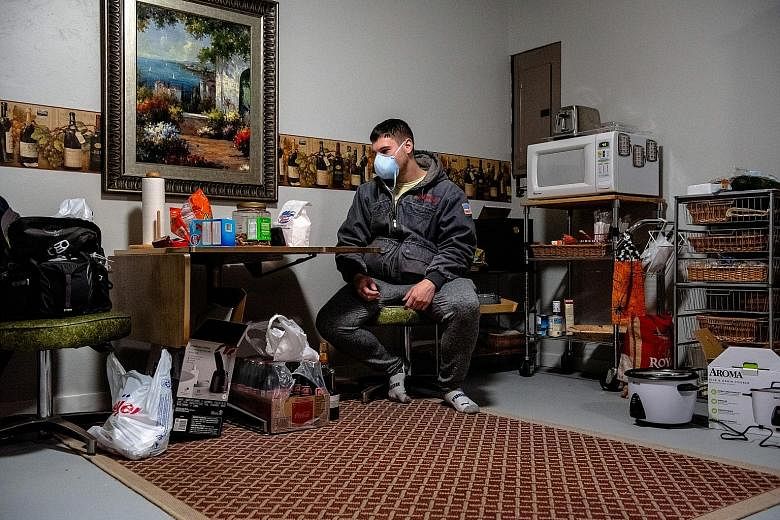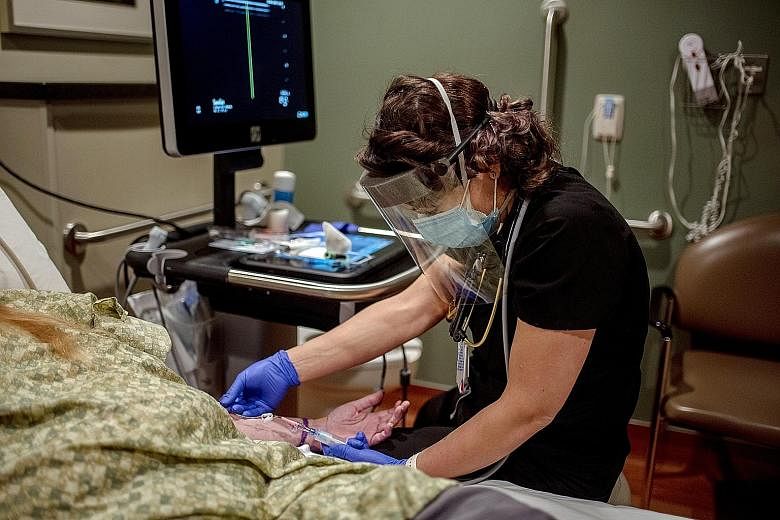NEW YORK • As the coronavirus cut a devastating path around the United States, Ms Laura Liffiton, 32, found herself racing along behind.
She arrived in New York City in April, on one of the worst days of the pandemic, for a stint as a nurse in the overrun intensive care unit of a crowded hospital.
After her contract there ended, she flew in July to another hot spot with an urgent need for nurses: a hospital in Arizona where four of her patients died of the coronavirus on her first day.
In October, she travelled to Green Bay, Wisconsin, just as the virus was surging uncontrollably throughout the Midwest.
"When the pandemic began, I thought, 'I'm going to go help, I can do some good, I can make some good money,' " she said.
But on the first day of treating coronavirus patients, Ms Liffiton remembered: "I was like Dorothy landing in Oz. I was totally unprepared for the reality."
As infections have spiked across the country, travel nurses, who work on temporary contracts for higher fees and move from city to city, have become more urgently needed than ever.
Centres for Disease Control and Prevention director Robert Redfield warned that the US was facing a devastating winter, predicting that total deaths from Covid-19 could reach close to 450,000 by next February unless a large percentage of Americans follow precautions like mask-wearing.
"The reality is, December and January and February are going to be rough times," he said. "I actually believe they're going to be the most difficult time in the public health history of this nation."
As hospitals fill with virus patients, the biggest need has been finding enough staff to tend to the critically ill. Demand for travel nurses has increased by more than 40 per cent in the past month, according to Aya Healthcare, an agency based in California that dispatches them to hospitals.
At least 25,000 nurses work in travel nursing, though the number fluctuates, and hospitals have depended on them for decades. It is a nomadic existence and, in a pandemic, a particularly high-risk one.
The nurses parachute into cities like New York, Phoenix, Los Angeles and Green Bay for weeks or months at a time, quickly learning the ways of a new hospital and trying to earn the trust of existing staff.
At the end of their shifts, they return to their temporary homes: hotels, Airbnb apartments or rented houses. Their families and friends are sometimes thousands of kilometres away, available only through phone calls or FaceTime.
Throughout the pandemic, Mr John Deaton, another travel nurse, has treated Covid-19 patients and even caught a mild case of the virus himself, working in El Centro, California, near the border with Mexico; Sacramento, California; and now Green Bay.
Places to stay in north-eastern Wisconsin were difficult to find. He settled for renting the basement in a house while the owner lived upstairs, negotiating for shared use of the kitchen so he would have more than a microwave to use for cooking.
The dynamic between staff nurses and travel nurses can be complicated. Mr Deaton, 27, said that when he was in Sacramento, staff nurses were given higher-quality equipment to use, such as air-purifying respirators, that travel nurses had to repeatedly request.
"We're here because they have a need," he said of hospitals. "We're not people that are going to be here later on."
Last month in Green Bay, where the surrounding county has averaged more than 150 cases a day since late September, a team of four travel nurses worked at Bellin Hospital, grappling with the unrelenting pressure of the emergency room and a Thanksgiving holiday far from home.
More than eight months into the pandemic, many travel nurses have done little else but treat Covid-19 patients.
Ms Liffiton shudders when recounting what she saw in New York in April: doctors and nurses who were overwhelmed, rows of intubated patients and little sense of when the devastation would end.
She still sleeps only about four hours a night, troubled by what she has seen throughout the pandemic. "It's hard," she said. "Even after I leave a place, the feelings stay."
Ms Morgan Fitzsimmons, 26, a travel nurse based in Lake Geneva, Wisconsin, has been treating coronavirus patients since a stint in Syracuse, New York, in July.
In Green Bay, where she is temporarily based, the weather has now turned cold and blustery. Some people are still gathering indoors, going to bars and to restaurants and weddings.
Just before the election, Ms Fitzsimmons said, she was treating a patient who repeated a conspiracy theory that has circulated on the Internet and in conservative media: The coronavirus is a hoax perpetuated by Democrats.
"I'm taking care of this man and he said, 'I can't wait for the election to be over so all this will all go away,' " she said. "And I'm like, 'That's not happening. It's real, I promise you, it's real.' "
Others have all but shrugged when they receive a positive coronavirus result.
"A lot of people tend to have the response, when they're told they have it, they're like, 'Oh, I've got the Covid'," said Ms Heather Ozmun, 46, a travel nurse in Green Bay.
"They're treating it like a rite of passage, like it's their turn to have it."
NYTIMES












